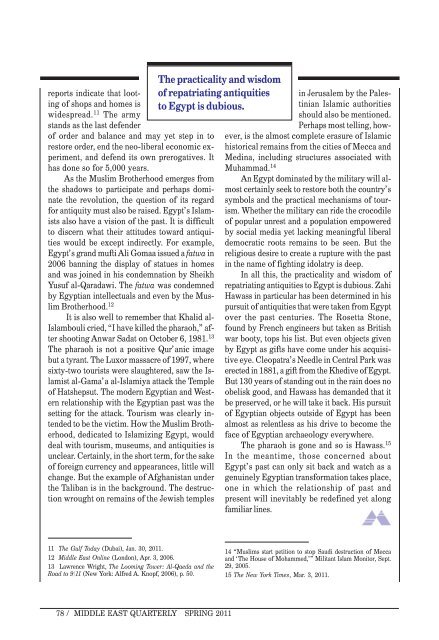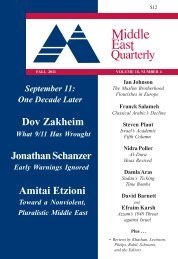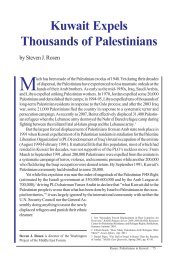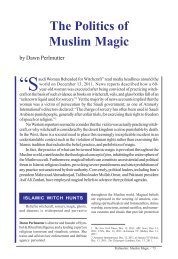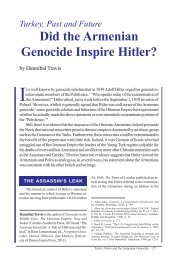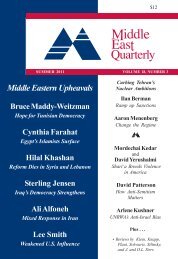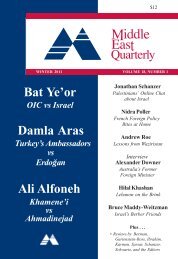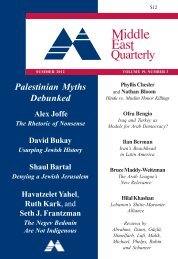eports indicate that lootingof shops and homes iswidespread. 11 The armystands as the last defenderof order and balance and may yet step in torestore order, end the neo-liberal economic experiment,and defend its own prerogatives. Ithas done so for 5,000 years.As the Muslim Brotherhood emerges fromthe shadows to participate and perhaps dominatethe revolution, the question of its regardfor antiquity must also be raised. Egypt’s Islamistsalso have a vision of the past. It is difficultto discern what their attitudes toward antiquitieswould be except indirectly. For example,Egypt’s grand mufti Ali Gomaa issued a fatwa in2006 banning the display of statues in homesand was joined in his condemnation by SheikhYusuf al-Qaradawi. The fatwa was condemnedby Egyptian intellectuals and even by the MuslimBrotherhood. 12It is also well to remember that Khalid al-Islambouli cried, “I have killed the pharaoh,” aftershooting Anwar Sadat on October 6, 1981. 13The pharaoh is not a positive Qur’anic imagebut a tyrant. The Luxor massacre of 1997, wheresixty-two tourists were slaughtered, saw the Islamistal-Gama’a al-Islamiya attack the Templeof Hatshepsut. The modern Egyptian and Westernrelationship with the Egyptian past was thesetting for the attack. Tourism was clearly intendedto be the victim. How the Muslim Brotherhood,dedicated to Islamizing Egypt, woulddeal with tourism, museums, and antiquities isunclear. Certainly, in the short term, for the sakeof foreign currency and appearances, little willchange. But the example of Afghanistan underthe Taliban is in the background. The destructionwrought on remains of the Jewish templesThe practicality and wisdomof repatriating antiquitiesto Egypt is dubious.in Jerusalem by the PalestinianIslamic authoritiesshould also be mentioned.Perhaps most telling, however,is the almost complete erasure of Islamichistorical remains from the cities of Mecca andMedina, including structures associated withMuhammad. 14An Egypt dominated by the military will almostcertainly seek to restore both the country’ssymbols and the practical mechanisms of tourism.Whether the military can ride the crocodileof popular unrest and a population empoweredby social media yet lacking meaningful liberaldemocratic roots remains to be seen. But thereligious desire to create a rupture with the pastin the name of fighting idolatry is deep.In all this, the practicality and wisdom ofrepatriating antiquities to Egypt is dubious. ZahiHawass in particular has been determined in hispursuit of antiquities that were taken from Egyptover the past centuries. The Rosetta Stone,found by French engineers but taken as Britishwar booty, tops his list. But even objects givenby Egypt as gifts have come under his acquisitiveeye. Cleopatra’s Needle in Central Park waserected in 1881, a gift from the Khedive of Egypt.But 130 years of standing out in the rain does noobelisk good, and Hawass has demanded that itbe preserved, or he will take it back. His pursuitof Egyptian objects outside of Egypt has beenalmost as relentless as his drive to become theface of Egyptian archaeology everywhere.The pharaoh is gone and so is Hawass. 15In the meantime, those concerned aboutEgypt’s past can only sit back and watch as agenuinely Egyptian transformation takes place,one in which the relationship of past andpresent will inevitably be redefined yet alongfamiliar lines.11 The Gulf Today (Dubai), Jan. 30, 2011.12 <strong>Middle</strong> <strong>East</strong> Online (London), Apr. 3, 2006.13 Lawrence Wright, The Looming Tower: Al-Qaeda and theRoad to 9/11 (New York: Alfred A. Knopf, 2006), p. 50.14 “Muslims start petition to stop Saudi destruction of Meccaand ‘The House of Mohammed,’” Militant Islam Monitor, Sept.29, 2005.15 The New York Times, Mar. 3, 2011.78 / MIDDLE EAST QUARTERLY SPRING 2011
DATELINEAll Ahmadinejad’s Menby Ali AlfonehMahmoud Ahmadinejad’s sacking of foreign minister Manouchehr Mottaki has openedanother chapter in the ongoing power struggle between the president and the supremeleader, Ali Khamene’i. Interpersonal as it may seem, this confrontation symbolizes thestruggle between the Islamic Republic’s old elites and Ahmadinejad’s burgeoning patronagenetwork, which challenges their authority. How has the president managed tobuild such a formidable power base? Who are the key members of his coterie, and willthey enable their benefactor to outsmart the supreme leader to become Iran’s effectiveruler?WAS KHAMENE’ITHE REAL TARGET?On December 13, 2010, while the foreignminister was on an official visit to Senegal,Ahmadinejad replaced Mottaki with Ali-AkbarSalehi, former Iran Atomic Energy Organizationdirector. 1 Following the public outrage aboutdismissing a cabinet minister on a diplomaticmission, “an informed source” claimed that thegovernment was unaware that Mottaki wasabroad. 2 But upon release of the news thatAhmadinejad himself had ordered Mottaki todeliver a personal message to the Senegalesepresident, 3 first vice president Mohammed-RezaRahimi and senior assistant Mojtaba SamarehHashemi said that Mottaki had been informedof the dismissal prior to the trip—a claim whichthe foreign minister denied. 4A model career diplomat, Mottaki was nevera key player in the Islamic Republic regime andAli Alfoneh is a resident fellow at the AmericanEnterprise Institute.owed his cabinet membership to Khamene’i.This, along with newly revealed informationabout the circumstances of his sacking, providesinsights into Ahmadinejad’s real target:the supreme leader.According to Ayandeh News, approximatelya week prior to Mottaki’s dismissal, Ahmadinejadhad privately complained to Khamene’i of “lackof coordination between [government] agenciesand [the presidency’s] restricted authority” andhad voiced his resolve to replace the foreign minister.No decision was made, and Ahmadinejaddid not raise the issue on his next meeting withKhamene’i on December 6, 2010. However, uponleaving the supreme leader’s office, the presidenttold one of Khamene’i’s secretaries that “he hadforgotten to raise the issue of Mottaki’s dismissalwith Ayatollah Khamene’i and asked him to informhim [Khamene’i] about it.” 51 Tabnak News Agency (Tehran), Dec. 13, 2010.2 Khabar Online (Tehran), Dec. 19, 2010.3 Farda News (Tehran), Jan. 1, 2011.4 Ibid., Dec. 19, 2010.5 Ayandeh News (Tehran), Jan. 2, 2011.Alfoneh: Ahmadinejad’s Network / 79
- Page 1 and 2:
$12SPRING 2011 VOLUME 18, NUMBER 2T
- Page 3 and 4:
SPRING 2011 VOLUME 18, NUMBER 2THE
- Page 5 and 6:
The Afghanistan ConflictMission Cre
- Page 7 and 8:
countries.” 5 Out of twentyfiveai
- Page 9 and 10:
Photo will not display.Rather than
- Page 11 and 12:
Tajik, Uzbek, and Hazara, known as
- Page 13 and 14:
Taliban and the Islamist Haqqaninet
- Page 15 and 16:
detrimental to any campaign. The ma
- Page 17 and 18:
47 Noah Feldman, What We Owe Iraq:
- Page 19 and 20:
The Afghanistan ConflictReforming t
- Page 21 and 22:
operations gave way to compellingth
- Page 23 and 24:
whether religious, economic, social
- Page 25 and 26:
Decentralization also imposesan obl
- Page 27 and 28:
ernmental goods and services to the
- Page 29 and 30: Photo will not display.Burqa-clad A
- Page 31 and 32: wifery-based prenatal and childbirt
- Page 33 and 34: The Afghanistan ConflictIndia’s C
- Page 35 and 36: allowing reciprocal concessionsto I
- Page 37 and 38: more autonomous foreign policy. The
- Page 39 and 40: 27 The Hindustan Times (New Delhi),
- Page 41 and 42: lateral political realignment. 35 F
- Page 43 and 44: Turkey’s Christiansunder Siegeby
- Page 45 and 46: new system of church-state relation
- Page 47 and 48: tion in Turkey by declaring his opp
- Page 49 and 50: efore firing his pistol. 38 BishopP
- Page 51 and 52: as an instrument of deal-makingwith
- Page 53 and 54: Turkish state minister Mehmet Aydø
- Page 55 and 56: Abbas vs. Obamaby Steven J. RosenHa
- Page 57 and 58: international community in supporto
- Page 59 and 60: Since the start of the Obama admini
- Page 61 and 62: Damascus on Trialby David SchenkerI
- Page 63 and 64: Hersh, if Washington had agreed to
- Page 65 and 66: 21 Reports of the judgment appeared
- Page 67 and 68: UTA airlines after Libya was found
- Page 69 and 70: NGOs vs. Israelby Ben-Dror YeminiOn
- Page 71 and 72: that news of an agreement leaks out
- Page 73 and 74: and a string of European states, in
- Page 75 and 76: DATELINEEgypt’s AntiquitiesCaught
- Page 77 and 78: DATELINEday. Antiquities represent
- Page 79: State and military industriesdomina
- Page 83 and 84: DATELINESadegh Zibakalam, 21 who re
- Page 85 and 86: The Science and TechnologyRing. Fol
- Page 87 and 88: DATELINELebanon’s Islamist Strong
- Page 89 and 90: Outward manifestations ofmodernity
- Page 91 and 92: minister’s militia, to serveas a
- Page 93 and 94: REVIEWSBrief ReviewsThe Arab Public
- Page 95 and 96: REVIEWSception. Their arguments are
- Page 97 and 98: REVIEWSMiddle East that is experien


